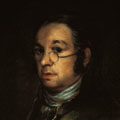








I was once told by a fellow of a college, says Mr. Ireland, that he disliked Hogarth, because he had in this print ridiculed one of the Universities. I endeavoured to defend the artist, by suggesting that this was not intended as a picture of what Oxford is now, but of what it was in days long past: that it was that kind of general satire with which no one should be offended, &c. &c. His reply was too memorable to be forgotten. "Sir, the Theatre, the Bench, the College of Physicians, and the Foot Guards, are fair objects of satire; but those venerable characters who have devoted their whole lives to feeding the lamp of learning with hallowed oil, are too sacred to be the sport of an uneducated painter. Their unremitting industry embraced the whole circle of the sciences, and in their logical disputations they displayed an acuteness that their followers must contemplate with astonishment. The present state of Oxford it is not necessary for me to analyze, as you contend that the satire is not directed against that."
In answer to this observation, which was uttered with becoming gravity, a gentleman present remarked, as follows. "For some of the ancient customs of this seminary of learning, I have much respect, but as to their dry treatises on logic, immaterial dissertations on materiality, and abstruse investigations of useless subjects, they are mere literary legerdemain. Their disputations being usually built on an undefinable chimera, are solved by a paradox. Instead of exercising their power of reason they exert their powers of sophistry, and divide and subdivide every subject with such casuistical minuteness, that those who are not convinced, are almost invariably confounded. This custom, it must be granted, is not quite so prevalent as it once was: a general spirit of reform is rapidly diffusing itself; and though I have heard cold-blooded declaimers assert, that these shades of science are become the retreats of ignorance, and the haunts of dissipation, I consider them as the great schools of urbanity, and favourite seats of the belles lettres. By the belles lettres, I mean history, biography, and poetry; that all these are universally cultivated, I can exemplify by the manner in which a highly accomplished young man, who is considered as a model by his fellow-collegians, divides his hours.
"At breakfast I found him studying the marvellous and eventful history of Baron Munchausen; a work whose periods are equally free from the long-winded obscurity of Tacitus, and the asthmatic terseness of Sallust. While his hair was dressing, he enlarged his imagination and improved his morals by studying Doctor what's his name's abridgement of Chesterfield's Principles of Politeness. To furnish himself with biographical information, and add to his stock of useful anecdote, he studied the Lives of the Highwaymen; in which he found many opportunities of exercising his genius and judgment in drawing parallels between the virtues and exploits of these modern worthies, and those dignified, and almost deified ancient heroes whose deeds are recorded in Plutarch and Nepos.
"With poetical studies, he is furnished by the English operas, which, added to the prologues, epilogues, and odes of the day, afford him higher entertainment than he could find in Homer or Virgil: he has not stored his memory with many epigrams, but of puns has a plentiful stock, and in conundra is a wholesale dealer. At the same college I know a most striking contrast, whose reading"—But as his opponent would hear no more, my advocate dropped the subject; and I will follow his example.
It seems probable, that when the artist engraved this print, he had only a general reference to an university lecture; the words datur vacuum were an after-thought. Some prints are without the inscription, and in some of the early impressions it is written with a pen.
The scene is laid at Oxford, and the person reading, universally admitted to be a Mr. Fisher, of Jesus College, registrat of the university, with whose consent this portrait was taken, and who lived until the 18th of March, 1761. That he should wish to have such a face handed down to posterity, in such company, is rather extraordinary, for all the band, except one man, have been steeped in the stream of stupidity. This gentleman has the profile of penetration; a projecting forehead, a Roman nose, thin lips, and a long pointed chin. His eye is bent on vacancy: it is evidently directed to the moon-faced idiot that crowns the pyramid, at whose round head, contrasted by a cornered cap, he with difficulty suppresses a laugh. Three fellows on the right hand of this fat, contented "first-born transmitter of a foolish face," have most degraded characters, and are much fitter for the stable than the college. If they ever read, it must be in Bracken's Farriery, or the Country Gentleman's Recreation. Two square-capped students a little beneath the top, one of whom is holding converse with an adjoining profile, and the other lifting up his eyebrows, and staring without sight, have the same misfortune that attended our first James—their tongues are rather too large. A figure in the left-hand corner has shut his eyes to think; and having, in his attempt to separate a syllogism, placed the forefinger of his right hand upon his forehead, has fallen asleep. The professor, a little above the book, endeavours by a projection of his under lip to assume importance; such characters are not uncommon: they are more solicitous to look wise, than to be so. Of Mr. Fisher it is not necessary to say much: he sat for his portrait, for the express purpose of having it inserted in the Lecture!—We want no other testimony of his talents.
 THE LECTURE.
THE LECTURE.